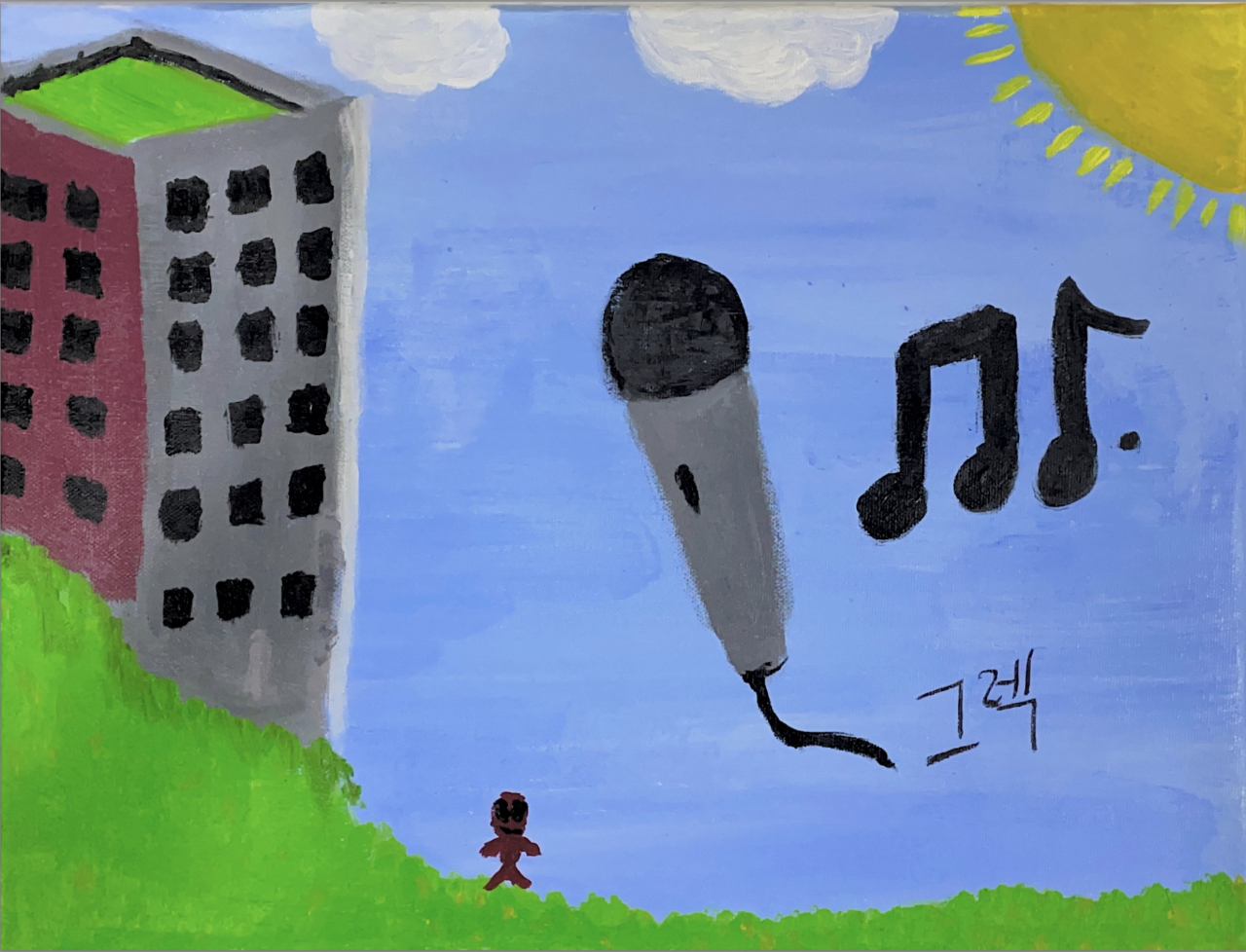K-pop is long since no longer confined to Korea, with artists across genres as well as trot singers venturing into the international market. However, back in the less globally connected 2000s this was not the case, and in 2009 Greg Priester bridged the gap from Indiana to Korea with soul music, creating a niche in the local music industry.
Priester, also known as “Greg-hyeong” here, shared his two-decade journey as a “foreign singer” in an interview for the “Life In Korea” video series with The Korea Herald.
 |
Greg Priester gestures during the shoot for the "Life In Korea" video series at The Korea Herald studio in Seoul. (The Korea Herald) |
From American classroom to Korean stage
In 2007, Priester arrived in Korea as an English teacher, stepping into a country he knew little about. After working as a high school math teacher in the US, he settled in Korea as an English instructor at Paju English Village. Paju English Village, now known as Gyeonggi Mirae Educational Institute, was South Korea’s first residential English camp for Korean students.
"The English village was an English town, where only using English was permitted to students. As an English-speaking foreigner, I received sufficient compensation at that time. However, I found it unsatisfying as I couldn’t fully utilize my educational background. Foreigners were perceived more as ‘English-speakers’ than educators," Priester said.
There, Priester's role was as an “edu-tainer” — an “educator” who was also an “entertainer.” And as an edu-tainer, he taught English to children by singing and engaging them with music.
"Singing was a part of my everyday routine, though I never envisioned myself pursuing it professionally," he reflected.
The turning point in Priester's life came unexpectedly. A simple outing to a singing room with colleagues unveiled a hidden talent that would redefine his path. His impressive vocal prowess led to an invitation to sing at a wedding. At one wedding, his performance caught the attention of a TV producer who offered him a spot on the audition show “Korea Global Super Idol.”
“At the show, the judges said, ‘You sing well, but you don’t believe you can sing.’ The quote touched on the confidence and arrowed through my heart. I think the critique was the most significant point that marked the beginning of my challenges as a singer,” he said.
This incident brought about a significant internal transition for him. Priester revealed that he faced numerous auditions and encountered many rejections. Despite lacking confidence in singing, he persevered by acting as if he were confident and continued to challenge himself.
“Many people might think I just went to popularity because they only see my viral moment. But I did not. It took several years of auditioning again and again.”
 |
Greg Priester appears on KBS' "National Singing Contest" in 2012. (Greg Priester) |
'Oddity led to overnight success'
Priester eventually found his first viral moment on "National Singing Contest," where his performance of "For You" brought a fresh impact to the Korean audience. This performance, while a breakthrough, also gave him a reputation as a novelty act, overshadowed by his foreign identity.
“People were fascinated with singing Korean songs infused with ‘American Soul.’ People started to call me ‘Heuk-Jae Beum,’ which means the Black version of ‘Yim Jae Beum (singer of ‘For You’). No one was calling my name, and it felt somewhat disrespectful.”
He achieved his second viral moment with the song “I Miss You” on Mnet music competition “Superstar K,” airing in 2014, and earned the nickname “Greg-hyeong" from the Korean public.
However, his identity in the Korean music scene oscillated between being an artist and a novelty, often referred to by nicknames such as “heuk-hyung,” which means "Black brother" in Korean.
"There were moments when I felt reduced to a novelty, recognized as a ‘foreigner’ who could sing Korean songs rather than a genuine artist. All comedians in Korea knew me, and they turned my rendition into a running joke. I suppose my English accent when pronouncing Korean lyrics became one of the hilarious points." Priester shared.
“It was hard to make people believe that I am a singer, not just a foreigner who sings well. Sometimes, I felt like a little puppet who happened to sing in Korean.”
 |
Album cover for Greg Priester's latest single, "Alien," released Dec. 12 (Greg Priester) |
Breaking into Korea’s music scene with 'American Soul'
As an African American venturing down an unprecedented path by singing Korean songs, Priester had to persuade the public and the Korean music industry to recognize him as a professional singer. When he released the single album “When We Were Young” in 2019, despite the song being written with Korean lyrics, the music distribution company placed it on international pop charts.
“BTS’ ‘Dynamite’ made it onto the K-pop chart, even though it was composed in English. I was categorized as a ‘foreign singer’ simply based on my appearance. I had to fight for many years to be listed on the K-pop chart. Now, songs sung by foreign singers, including mine, are listed based on their genre and language,” he explained.
Priester, however, leveraged his “oddity” into a distinctiveness. He continued to infuse his music with “American Soul,” prompting Korean media to take him as a serious artist. His growing popularity led him to explore acting, host an English educational radio program, and develop his YouTube channel, which he started in 2007. His endeavors created diverse landscapes previously unseen in Korean media and fostered familiarity with African Americans.
As a "meme star" who has experienced the peaks and valleys of moderate fame, he established a unique genre within the Korean music scene through his distinctiveness. He has evolved into a singer-songwriter, composing and writing songs in Korean. This year, Priester has released “The Initial,” “Nostalgia Man,” “Amazing Love,” “Dance” and "Alien," as he gears up for the release of a new full album.
 |
Greg Priester's artwork for The Korea Herald's video series, "Life In Korea" (The Korea Herald) |
Double-edged sword of being a foreign singer
Reflecting on his life in South Korea since 2007, he says that he has observed a changing perspective in Korea towards foreigners, especially those who are Black.
“Korea has become much more open up and globalized since 2007. Had I come to Korea more recently, I might not have received the same attention,” he said.
“It’s like a double-edged sword. At that time, it was rare for a foreigner like me to be in the Korean music industry, especially in the ballad scene. Confined to the ‘foreigner singer’ was challenging, but at the same time, it allowed me to garner attention from the Korean audience.”
“I might have been lucky to be famous in Korea, but knocking on doors took a lot of effort and work. However, overall, the journey of being a singer-songwriter in Korea made me love myself and believe in myself more,” he said.
To learn more about Greg Priester as an African American who broke into Korea’s music scene during a time when there was little visibility for foreigners, and to get behind-the-scenes insights into his journey, check out “Life in Korea” on The Korea Herald YouTube channel.
 |
Greg Priester smiles during the shoot for the "Life In Korea" video series at The Korea Herald studio in Seoul. (The Korea Herald) |







![[Today’s K-pop] Blackpink’s Jennie, Lisa invited to Coachella as solo acts](http://res.heraldm.com/phpwas/restmb_idxmake.php?idx=644&simg=/content/image/2024/11/21/20241121050099_0.jpg)